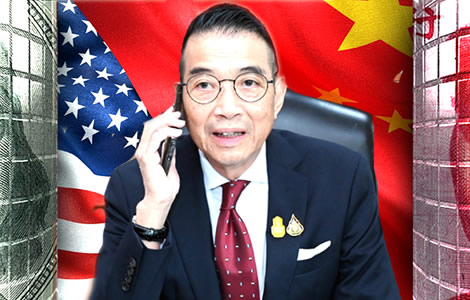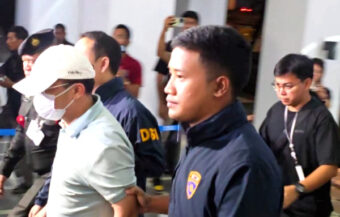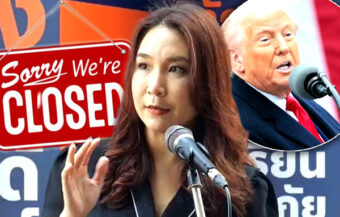Thai Foreign Minister Maris Sangiampongsa at a BRICS Summit in Russia this week insisted Thailand remains unaligned despite applying to join BRICS alongside Russia and China. It raises questions about its 1954 US military defence treaty, the Manila Pact amid rising South China Sea tensions.
Thailand has applied to join the BRICS group of countries, aligned with Russia and China. The move has surprised many Western diplomats and foreign affairs analysts. It also comes as questions are being asked about Thailand’s commitment to its military defence treaty with the United States and other Southeast Asian partners under the 1954 Manila Pact. Current tensions in the South China Sea between the Philippines and China may present a challenge at any moment. In Singapore, at the end of May, Philippines President Ferdinand Marcos Jr. sounded an ominous warning. He said the single loss of a Philippine soldier in its South China Sea standoff with Chinese forces would almost certainly be an act of war.

On Thursday in Nizhny Novgorod, Thai Minister of Foreign Affairs Maris Sangiampongsa insisted that the kingdom’s application to join the BRICS group of countries did not signal support for any side or an attempt to ‘counteract’ anyone else’s power.
Mr Maris was emerging from a meeting of BRICS foreign ministers. However, the kingdom’s stunning decision last week to join the bloc has raised both eyebrows and questions.
Minister Maris portrayed BRICS as an economic opportunity and a strengthening of Thailand’s voice in the world. He spoke of justice for developing countries
Nonetheless, on Thursday, Mr Maris saw the BRICS network of countries as an economic opportunity.
At the same time, he spoke about justice and equality for emerging or developing countries. Indeed, he said it was about developing countries playing a greater role in driving world affairs.
Significantly, he explained that Thailand has also applied for full membership of the Organisation for Economic Co-operation and Development (OECD).
In short, the OECD is seen as pro-Western. It is headquartered in Paris and emphasises developing modern governance linking inclusive economic development with social values and ethics.
Thai Defence Minister speaks of a ‘golden land’ seeking to act only for peace in the Indo-Pacific
Ironclad partnership heralded as Marcos visits Washington amid raised South China Sea tensions
On Thursday, Minister Maris linked this with Thailand’s non-aligned position.
Indeed, his speech was quite similar to the address given weeks ago at the Shangri-La Dialogue summit in Singapore by Minister of Defence Sutin Klangsaeng.
‘Friendly with all countries and no one’s enemy’ insisted Thailand’s Foreign Affairs Minister despite the kingdom’s position as an American military ally
‘Thailand has a special characteristic. We are friendly to all countries and are no one’s enemy. We can be a bridge with developing countries, with BRICS member countries, and also help connect BRICS with other groups. This will help make BRICS member countries more powerful in negotiations so that the international community can see the importance of developing and emerging countries,’ Mr Maris said.
Previously, the Shangri-La Summit in Singapore at the end of May saw a significant development. It heard an address by Philippines President Ferdinand Marcos Jr.
The Philippines leader was referring to escalating tensions between his armed forces and Chinese naval forces. This is taking place at the Scarborough Shoal in the South China Sea.
Growing and dangerous tensions in the South China Sea have emerged as a potential flashpoint in Southeast Asia for war between the United States and China
Over the past month, the situation has become dangerous, with Philippine military personnel brandishing weapons. This comes following persistent attempts by Chinese forces to frustrate the resupply of an outpost at sea.
In Singapore, President Marcos warned that the death of any Philippine military personnel would be a red line for his country.
Additionally, he said that such an event would almost certainly be an act of war.
It would be ‘very, very close to what we define as an act of war,’ the Philippines leader told his audience. Furthermore, he said. ‘Our treaty partners, I believe, also hold that same standard.’
Manila Pact signed by Thailand, the US, the Philippines and Western-aligned countries on September 8th 1954. Thailand under the treaty is not unaligned
In the meantime, one of those partners is Thailand as well as the United States.
Thailand is a signatory to the Southeast Asian Collective Defense Treaty in 1954 (Manila Pact). Indeed, this led to later participation by Thailand and the Philippines in the now-defunct Southeast Asia Treaty Organisation.
Thailand signed up on September 8th 1954 in the Philippines capital Manila. Other countries include Australia, France, New Zealand, Pakistan, the Philippines, and the United Kingdom.
US Defence Chief asserts Thailand’s position as a key military ally in a tense Indo-Pacific region
Indeed, as part of that pact, Thailand and the United States regularly conduct the Cobra Gold exercises, which are the largest multilateral military exercises held in the Asia-Pacific on a regular basis.
1954 Pact has since been confirmed and updated
Thailand’s defence alliance with the United States has since been strengthened and updated. The most recent announcement was a 2019 treaty.
Certainly in a formal visit to Thailand in June 2022, US Secretary of Defence Lloyd Austin referred to the pact. He reminded the kingdom of its status as a military ally.
Indeed, the Manila Pact was confirmed by the Thanat-Rusk communiqué of 1962.
More significantly, the 2020 Joint Vision Statement for the Thai-US Defense Alliance. This further reinforced the defence alliance between Thailand, the United States and its allies.
The latter was signed by Thai Prime Minister Prayut Chan Ocha in 2019.
It updated the treaty to include an emphasis on Thailand’s role as a member of the ASEAN bloc which includes the Philippines.
Thailand for decades has been a US partner in military efforts and crime-fighting campaigns, in particular, against illicit drugs and human trafficking
Furthermore, since 1950, Thailand has received arms, training, and logistical support from the United States military.
At the same time, the International Law Enforcement Academy-Bangkok, a US-financed institution, trains Thai police and other Asian police forces in the capital.
The deep institutional cooperation between the United States and Thailand also extends to combating the drug menace. The two countries are also engaged in policing efforts against human trafficking and piracy at sea.
As part of this, the U.S. Drug Enforcement Administration has a base at the US Consulate on Witchayanond Road in Chiang Mai.
Thailand’s alliance with the United States and previous history, at first glance, appear incongruent with BRICS membership in a more polarised world
Certainly, this all seems quite incongruous with BRICS membership and Thailand’s claims to be non-aligned.
However, BRICS as an intergovernmental organisation appears to be broadening its base, including Brazil, Russia, India, China, South Africa, Iran, Egypt, Ethiopia, and the United Arab Emirates.
Significantly, Argentina, under its recently elected right-wing president Javier Milei, withdrew its application to join the body.
President Milei said his government’s foreign policy differed ‘in many ways from that of the previous government’ when announcing his move.
Certainly, it followed strains in its relationship with China and its growing influence over the South American country. Indeed, President Milei described BRICS membership as a ‘pact with Communists’ before scuppering the plan.
Nonetheless, the new bloc is dominated economically by China. At the same time, it is increasingly seen as an anti-Western counterpoint, something that has been reinforced by the war in Ukraine.
A potential breakout of war in the South China Sea between the Philippines and China would put Thailand’s position as a Manila Pact member to the test
Undoubtedly, there is presently a rising threat to Thailand’s ‘unaligned’ claim being put to the test.
This comes with events in both the South China Sea and Taiwan. However, the standoff between the Philippines and Chinese forces is particularly dangerous.
Previously, Thailand’s relationship with the United States took a blow after General Prayut Chan-o-cha’s 2014 coup d’état. The US cancelled the Cobra exercises and training programmes stateside for Thai military officers.
Meanwhile, in contrast, it forged new training relationships with China and the People’s Liberation Army (PLA).
Moreover, it began to purchase weapons and military equipment from China. Not only that, but at one point, the kingdom foresaw a defence industry development in Khon Kaen. Later, that project was shelved.
Public opinion in Thailand in the last 70 years has switched dramatically. A survey by a Singapore institute shows massive support for China among people
Certainly, Thai public opinion has changed. Despite reports of a large number of educated young Thais supporting the United States as an upholder of democracy and opposition to Chinese authoritarianism, support for Beijing is rising in the kingdom.
For instance, the Yusof Ishak Institute in Singapore recently completed a survey of nearly 2,000 people in ASEAN. The top-line result showed rising support for China.
In 2024, 49.54% of people supported the United States compared to 50.5% support for China. Before that, in a similar survey in 2023, the proportion was 61.1% to 38.9% in favour of the US.
Significantly, support for China in the kingdom was the second highest in ASEAN. 70.6% support the communist country. In contrast, only 11.4% plumped for the United States.
Indeed, Thailand was among a group of countries where US support is at a low ebb. These include Laos (8.1%), Brunei (7.8%), Indonesia (7.9%), and Malaysia (9.3%).
In the meantime, support for the United States was surprisingly stronger in Singapore (20.5%), Cambodia (20.1%), and Myanmar (19.6%).
Lastly, the largest extent of support for America was in the Philippines with 27.3%. However, even here, support for China was marginally higher at 30.7%.
Join the Thai News forum, follow Thai Examiner on Facebook here
Receive all our stories as they come out on Telegram here
Follow Thai Examiner here
Further reading:
Thai Defence Minister speaks of a ‘golden land’ seeking to act only for peace in the Indo-Pacific
China’s Embassy calls on Thai media to censor its coverage of Taiwan to protect relationships
War with China is a rising spectre that must be confronted as US General predicts conflict by 2025
Bad news from Beijing with Xi’s rise, the prospect of war and a divided world have greatly grown
Abe’s legacy will be his efforts to awaken Japan and build a defensive alliance against China
Former Pheu Thai finance minister expresses unease about US regional moves to counter China’s rise
Prayut unveils 3 ‘R’ strategy for a deeper and broader partnership with the US on the economy
Thailand and Japan announce defence pact on visit by Japanese PM to Bangkok ahead of US summit
US ASEAN summit as ‘dangerous directions’ now emerging in Asia as China’s regional power rises


















